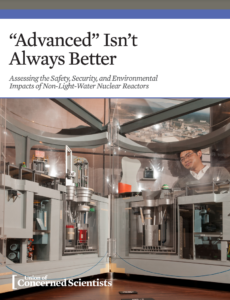Full Title: "Advanced" Isn't Always Better: Assessing the Safety, Security, and Environmental Impacts of Non-Light-Water Nuclear Reactors
Author(s): Edwin Lyman
Publisher(s): Union of Concerned Scientists
Publication Date: March 18, 2021
Full Text: Download Resource
Description (excerpt):
If nuclear power is to play an expanded role in helping address climate change, newly built reactors must be demonstrably safer and more secure than current generation reactors. Unfortunately, most “advanced” nuclear reactors are anything but.
The Union of Concerned Scientists undertook a comprehensive analysis of the most prominent and well-funded non-light-water reactor (NLWR) designs. We asked:
- What are the benefits and risks of NLWRs and their fuel cycles ?
- Do the likely overall benefits of NLWRs outweigh the risks and justify the substantial public and private investments needed to commercialize them?
- Can NLWRs be safely and securely commercialized in time to contribute significantly to averting the climate crisis?
Based on the available evidence, we found that the NLWR designs we analyzed are not likely to be significantly safer than today’s nuclear plants. In fact, certain alternative reactor designs pose even more safety, proliferation, and environmental risks than the current fleet.
